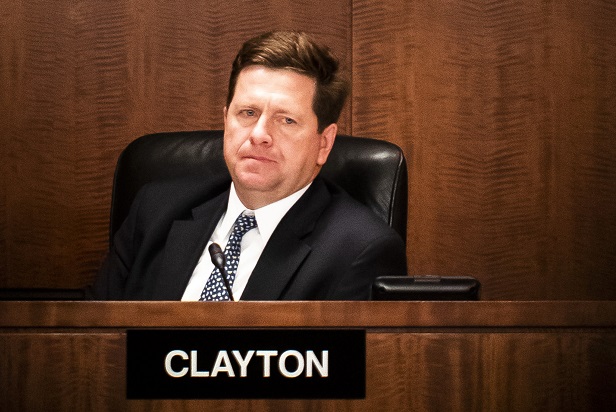 ChairmanJay Clayton during an open meeting of the U.S. Securities andExchange Commission, on Wednesday, June 5, 2019. (Photo: Diego M.Radzinschi/ALM)
ChairmanJay Clayton during an open meeting of the U.S. Securities andExchange Commission, on Wednesday, June 5, 2019. (Photo: Diego M.Radzinschi/ALM)
When Securities and Exchange Commission (SEC) chairman JayClayton handed a policy win to corporate executives inNovember [with the SEC proposal to revamp shareholder voting rules], he pointed toa surprising source of support: a mailbag full of encouragement fromordinary Americans.
|To hear Clayton tell it, these folks are really focused on theintricacies of the corporate shareholder-voting process. "Some ofthe letters that struck me the most," he said at a commissionmeeting in Washington, "came from long-term Main Streetinvestors, including an Army veteran and a Marine veteran, a policeofficer, a retired teacher, a public servant, a single mom, acouple of retirees who saved for retirement." Each bolsteredClayton's case for limiting the power of dissentingshareholders.
|But a close look at the seven letters Clayton highlighted, andabout two dozen others submitted to the SEC by supposedly regularpeople, shows they are the product of a misleading—and laughablyclumsy—public relations campaign by corporate interests.
|That retired teacher?Pauline Yee said she never wrote a letter, although the signaturewas hers. Those military vets? It turns outthey're the brother and cousin of the chairman of 60 PlusAssociation, a Virginia-based advocacy group paid by corporatesupporters of the SEC initiative. That single mom? Data embedded inthe electronically submitted letter says someoneat 60 Plus wrote it. That retired couple? Theirson-in-law runs 60 Plus.
|"I never wrote a letter," said one of the retirees, VytautasAlksninis, reached by phone at his home in Connecticut. "What'sthis all about?"
|Then there's the public servant Clayton mentioned. Marie Reed'sletter has sharpwords for proxy advisers, firms that counsel fund companies on howto vote at shareholder meetings. But when reached by phone inCalifornia, the retired state worker said she wasn't familiar withthe term. She said the letter originated with a public-affairs firmthat contacted her out of the blue.
|"They wrote it, and I allowed them to use my name after I readit," she said. "I didn't go digging into all of this."
|The SEC declined to comment on any irregularities with theletters. In a Tuesday interview, Clayton sidestepped a questionabout how the agency ensures comment letters are genuine. He didemphasize that the regulator's potential revamp of shareholdervoting rules are proposals, adding that there will be ample timefor people on both sides to weigh in before any changes arefinalized.
|"We welcome input in all ways," Clayton said in the interviewwith Bloomberg Television's David Westin. "On this issue, wherethere are a lot of different views and a lot of differentinterests, we encourage people to come in and talk to us, send ustheir comments."
|Unusual error appears in 2 dozen differentletters
Even a casual reading of the letters shows that something isamiss. Four of the seven bear the same unusual error—anout-of-context phrase inserted into the SEC's mailing address. Thesame mistake turns up in at least 20 other letters submitted bysupposedly ordinary Americans in support of the change. It's aninadvertent digital fingerprint revealing the scope of thecampaign.
|At issue is the proxy process, the rules for how corporationsconduct shareholder votes, such as when directors stand forre-election at annual meetings. Most of the time, management winsin a landslide. But shareholders occasionally revolt over excessivepay or mismanagement, or a small investor may force a vote on anissue that management doesn't endorse.
|In recent years, more small shareholders have been proposingresolutions about social or environmental issues such as climatechange. And investment managers that control large numbers ofvotes, such as BlackRock Inc., have begun prioritizing these topics aswell, arguing that they're relevant to the long-term sustainabilityof business models. That's an unwelcome change for some corporateboards, especially in the fossil-fuel industry.
|Last year, the National Association of Manufacturers (NAM)helped form the MainStreet Investors Coalition to oppose what it calls the"politicization" of the investment process and to argue that fundmanagers and boards should focus on maximizing profits. One ofits priorities is changing shareholder voting rules.
|Although the coalition has other members, NAM provided most ofits initial funding, according to a person with knowledge of thearrangement who spoke on condition of anonymity. The manufacturers'association represents corporate giants such as Exxon Mobil Corp.and Chevron Corp.
|NAM said in a statement that it didn't fund 60 Plus or directany advocacy efforts on the SEC issue. Chevron wouldn't comment onthe coalition but acknowledged in a statement that it sometimesworks with trade associations to "help inform their understandingof issues." Exxon Mobil said it had no immediate comment.
|Organized campaign by 60 Plus
Last year, Clayton signaled he was considering changes to therules and issued a call forpublic comments. Letters poured in. Most were from investmentfirms, corporations, trade groups, and other interested partiesthat openly identified themselves. Many fund managers wrote to saysome of the changes under consideration would becounterproductive.
|NAM, Exxon Mobil, and Chevron all called for new limits onshareholders' proposals. So did two ordinary citizens whoidentified themselves as members of Main Street Investors. Otherletters were ostensibly written by regular folks.
|But more than two dozen of them appear to have ties to 60 Plus,a member of the Main Street Investors Coalition. While thenonprofit group calls itself an advocate for senior citizens'issues, it routinely takes money from corporations and advocatesfor their causes on issues as varied as sugar subsidies andAlabama utilitycommissioners.
|The group didn't cast a wide net in recruiting letter writers.Names included those of a woman who used towork at 60 Plus's accounting firm; a former secretary at60 Plus; and various friends and relatives of Saul Anuzis,president of 60 Plus. None mentioned a connection to theorganization.
|One letter bore the nameof Chad Connelly. In an email, Connelly acknowledged being friendswith Anuzis but disavowed the letter. "Someone apparently used myname," he wrote. "That's not a letter I've ever even seen."
|Even Scott Hogenson, a contractor for 60 Plus who has appearedin the press as its spokesman, submitted a comment. The lettergives his name as S. Alan Hogenson and doesn't mention hisrelationship to the group. In an interview, Hogenson said he wrotethe letter and stands by it.
|Anuzis acknowledged that 60 Plus recruited submitters; provideddrafts; and, in two cases, sent letters on members' behalf. He alsoacknowledged getting money from members of the coalition. "We don'tget paid for specific projects," he said in an interview. "We getcontributions from members who are part of the coalition. We're notgetting paid for a specific letter."
|Anuzis said the project aligns with 60 Plus's policy goals andthat no names were used without permission. Those who said theyhadn't agreed, such as his in-laws, were mistaken. "They are80-some-years old," he said. "This happened months ago. I'm sureit's not top of their minds."
|Clandestine aid
Two letters point to another source of clandestine aid for thecoalition. Reed, the retired state worker from California whoseletter was cited by Clayton, said the man who provided her with aletter worked at FSB Core Strategies, aCalifornia public-affairs shop, and said he was working on behalfof a group called Protect Our Pensions. Another SEC lettercontaining similar phrases, also cited by Clayton, came from aCalifornia sheriffwho said in a 2017 interview that he was introduced to Protect OurPensions by the same FSB staffer. An FSB executive didn't respondto requests for comment.
|Protect Our Pensions, whose talking points align with those ofthe fossil fuel industry, was the subject of a 2017 BloombergBusinessweek article showing it was put together by corporatepublic-affairs employees and that some of its alleged members,including the retired firefighter identified as its founder, saidthey had nothing to do with it or couldn't remember agreeing tojoin.
|Opponents of changes to the voting system stuffed the SEC'smailbox too. The agency reported getting more than 18,000 identicalform letters supporting thecurrent rules. Those letters were obvious duplicates and aregrouped together on the SEC's comments page. Clayton's speechdidn't mention them.
|In his November 5 remarks, Clayton unveiled proposals along the lines of thosepushed by Main Street Investors Coalition and its corporatebackers that would shift power from investors to corporateboards. In addition to Clayton, who was appointed by PresidentDonald Trump, the changes are backed by two Republicans on thefive-member commission. For the changes to take effect, the SECwill have to vote again to finalize the rules after a 60-day publiccomment period.
|The SEC's proposal would increase the amount of stock that newershareholders must own to get a proposal on the ballot, aligningwith corporate claims that many resolutions are wastes of time andmoney. Under current rules, investors must have owned at least$2,000 of stock for a year before they can submit resolutions. TheSEC's proposal would raise that dollar threshold to $25,000 forshareholders of less than two years and $15,000 for shareholders ofless than three years, while leaving the $2,000 threshold in placefor longer-term holders.
|The proposal also would impose new restrictions onproxy-advisory firms, whose recommendations are often decisive onshareholder votes. Corporations complain that their advice issometimes poorly reasoned or inscrutable. Clayton would require thefirms to show their recommendations to companies before issuingthem.
|Fund managers warn the measure may have a chilling effect onproxy advisers, because a corporation could threaten a lawsuit if adraft recommendation isn't revised.
|Anuzis said he was glad to hear that Clayton had cited lettersgenerated by his organization. "I'm extremely proud that we werevery effective," he said. "If four of our letters were quoted, thatmeans we did a great job."
–With assistance from BenBain.Complete your profile to continue reading and get FREE access to BenefitsPRO, part of your ALM digital membership.
Your access to unlimited BenefitsPRO content isn’t changing.
Once you are an ALM digital member, you’ll receive:
- Critical BenefitsPRO information including cutting edge post-reform success strategies, access to educational webcasts and videos, resources from industry leaders, and informative Newsletters.
- Exclusive discounts on ALM, BenefitsPRO magazine and BenefitsPRO.com events
- Access to other award-winning ALM websites including ThinkAdvisor.com and Law.com
Already have an account? Sign In
© 2024 ALM Global, LLC, All Rights Reserved. Request academic re-use from www.copyright.com. All other uses, submit a request to [email protected]. For more information visit Asset & Logo Licensing.








